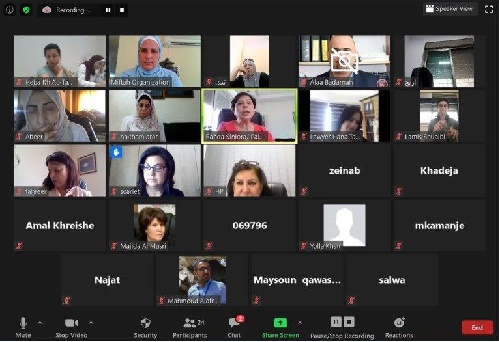|
MIFTAH holds discussion of report on policies and measures of sharia and ecclesiastic courts in the West Bank and Gaza Strip
Ramallah – 13/8/2020 -- As part of MIFTAH’s discussions, the Civil Society Coalition for the Personal Status Law held a session to discuss MIFTAH’s report on the policies and measures of sharia and ecclesiastic courts in the West Bank and Gaza Strip and the most prominent challenges facing women and girls in obtaining justice. They particularly discussed the provisions of the law pertaining to the age of marriage, divorce, guardianship, child custody and joint funds. The report broached a number of issues regarding the personal status system whereby policy for the legislative status system is to maintain the prevalent legislation from previous political eras without amendments. These legislations in turn, have reflected on the status of Palestinian women given the plurality of legislation that led to the categorization of Palestinian women according to religion, geographic location and political status. The content of legislation and legal provisions impacted procedures of sharia law in carrying out these provisions and which in turn impacted women’s access to justice. The report concluded with a presentation of local and Arab experiences and approaches for developing the system of personal status laws. The report indicated that the development of litigation procedures in sharia courts cannot happen in isolation of developing enacted personal status laws. That is, procedural laws, directives and rulings from the Chief Justice cannot contradict with the content of personal status laws. The report suggested several policies for developing the personal status system, most prominently: legislators should adopt a legislative policy regarding mechanisms for changing personal status laws in force in the West Bank and Gaza Strip, which include Jerusalem; holding a societal discussion on the mechanisms for a unified personal status law based on the principles of equality in rights and duties and the elevation of the status of Palestinian families. At the same time, this should coincide with CEDAW (The Convention on the Elimination of all Forms of Discrimination Against Women) and the provisions of Article 16. The report also called for the need to amend litigation laws in family courts to include the following policies: to follow approved legal procedures, beginning from their publication in the official gazette to publishing all their subsequent amendments and legalizing all of the procedures adopted in family matters; establishing departments for family courts in all parts of the homeland to facilitate access to them by everyone; to take into consideration the principle of confidentiality in family cases as a general principle, given the nature of these cases, which is a departure from publicized courts; facilitating litigation procedures in cases of separation or the termination of marriage, in line with the principle that both parties have the right to sign a marriage contract and also terminate it; the alimony required should be based on the minimum wage and methods of obtaining it must be facilitated; shortening the period for these procedures and developing the concept of settling and institutionalizing family disputes and mediation inside family courts; ending the work of so-called arbitrators in addition to reconsidering the value of financial fees in lawsuits on family matters; adopting a system for legal aid for marginalized sectors and working on raising the age of marriage. The report’s presentation was followed by a number of interventions from participants, which included recommendations such as: demanding a unified personal status law that preserves the dignity of women and gives them their freedom through the creation of a contemporary, civil law; the need to differentiate between a system of laws or a relevant legislation package on the one hand, and practices, through policies and enacted procedures in ecclesiastical and sharia courts on the other; focusing on the gaps from which women suffer due to these practices. The recommendations also included a demand for a constitutional amendment to the Basic Law in striving for a civil state; to unify all laws in ecclesiastical courts among the various denominations; unifying sharia law between the West Bank and Gaza Strip; working towards a Palestinian law that is based on a women’s rights approach regarding personal status in all family matters; a call on the coalition and all of its members and institutions to formulate a vision for this path in parallel with carrying out reforms regarding the provisions of enacted laws; calling on the coalition to begin practical steps towards realizing this Palestinian law; arranging a meeting to have another discussion on the points of agreement and differences and the proposed scenarios, and to learn from the experiences of neighboring countries. On her part, coordinator for the Civil Society Coalition for the Personal Status Law, Haitham Arar confirmed the need to initiate another discussion over certain key issues that were proposed during the session. The report is to be followed by a discussion of public policy papers that resulted from the study, a discussion on a rights-based personal status law in Palestine and on the principles of citizenship, equality indiscrimination against women. There will also be a discussion on expanding participation in the civil society coalition to include other social sectors and enriching the coalition’s vision on the personal status law. MIFTAH project manager, Najwa Sandouka-Yaghi maintained that the session was part of interventions within the Oxfam-funded “Conflict and Fragility” project. She also said it was a continuation of MIFTAH’s efforts, in coordination with the General Union of Palestinian Women, which heads the civil coalition, to make reforms and amendments to enacted personal status laws, policies and procedures in parallel with national efforts to develop a Palestinian law based on a women’s-rights approach in addressing personal status and family matters.

http://www.miftah.org |